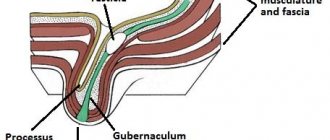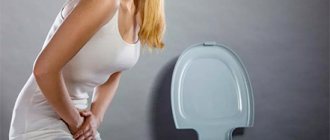If the inflammatory process in the bladder continues for a long time and leads to structural and functional changes in its wall, the patient is diagnosed with chronic cystitis. There may be a latent course of the pathology, in which remissions and exacerbations alternate, or symptoms may be constantly present.
Diagnostic measures are carried out based on the results of certain studies (urinalysis, ultrasound, analysis for sexually transmitted diseases, cystography, cystoscopy, endovesical biopsy). The patient is prescribed antibacterial and local therapy, and the hormonal and immune status is corrected. If necessary, surgical intervention is performed.
Why does chronic cystitis develop?
- The presence in the patient’s body of a source with chronic infection. This includes both an infection of the genitourinary system (vaginitis, metritis, prostatitis, urethritis) and one that is not associated with the pelvic organs. This refers to the presence of tonsillitis and caries.
- Stagnation in the urinary tract (neoplasm, stone).
- Congestion that is not associated with diseases of the urinary system (stroke, spinal cord injury).
- Local immunity is impaired, that is, the resistance of the mucous membranes of the bladder is reduced (during menopause), viral or fungal infection, and polyps are present.
- An infection that is sexually transmitted.
- Anatomical feature of the urethra in women. They have it wider and shorter, which allows the infection to enter the bladder without any obstacles.
Causes
The cause of 80% of all cystitis is an infection, namely, Escherichia coli, less often - staphylococcus, streptococcus and enterococcus, Proteus. Cystitis caused by mycoplasma, chlamydia, mycobacterium tuberculosis, treponema pallidum, and herpes virus also occurs.
There are various possible ways for an infectious agent to enter the bladder, namely:
- descending (from the upper urinary tract - kidneys and ureters);
- with lymph flow (from the pelvic organs);
- with the bloodstream (from remotely located foci of infection);
- ascending (from the area of the external genitalia and urethra; in women it occurs in the vast majority of cases);
- contact (through the wall of the bladder from foci of inflammation located next to it).
Factors that increase the likelihood of developing cystitis in women are the anatomical features of the structure of their urethra. It is short, quite wide and located near the anus - a source of pathogenic microorganisms.
Not every bladder infection will cause cystitis. The bladder mucosa of a healthy body can fight back even a serious infection - for this it produces so-called protective factors. If for some reason (hypothermia, stress, chronic fatigue, hypovitaminosis, serious illnesses and others) they weaken and microbes enter the bladder, a disease develops.
The causes of non-infectious cystitis are:
- chemicals (chemical cystitis);
- radiation exposure (radiation cystitis);
- medications (especially those used for chemotherapy);
- traumatization of the organ mucosa by stones, foreign bodies, endoscopes, and so on.
In some cases, the inflammation is initially aseptic in nature, and later an infection joins it.
Risk factors
There are factors that increase the likelihood of developing cystitis. This happens when:
- sedentary lifestyle.
- regular hypothermia of the body.
- Constant use of tight underwear.
- Frequently changing sexual partners when contraceptives are not used.
- Failure to comply with hygiene rules.
- Chronic disease of one or another internal organ.
- Overwork, hypovitaminosis.
- Impaired bladder emptying.
- Reduced protective functions of the body.
- The presence of a foreign body located in the bladder.
Prevention of exacerbations
Many people suffer from cystitis; in order to prevent the disease, the following recommendations must be followed:
- Maintain personal hygiene. Women need to change pads every three hours during menstruation. Take a shower daily, morning and evening. It is advisable to wash yourself after defecation.
- The genitals and lower back should be kept warm. There is no need to wear short skirts or low-waisted jeans in cold weather.
- Prevent infection from entering the body, monitor the condition of teeth, treat genitourinary diseases.
- Avoid indiscriminate sexual contact. Live sexually with one partner, do not use anal sex in relationships. After the act you need to wash.
- Monitor your immune system; frequent colds indicate reduced body defense against pathogenic microorganisms.
- Avoid dysbacteriosis. Normal microflora can protect the body from the penetration of harmful bacteria.
- If you have a sedentary life, take walks in the fresh air.
- For various diseases, consult a doctor. Sexually transmitted and gynecological abnormalities can provoke cystitis.
- Empty your bladder on time; prolonged abstinence causes disease.
- Clothes that are too tight cause blood stagnation, which is the cause of the disease.
- Make sure you eat well and drink plenty of water.
Following these simple recommendations will help avoid abnormalities in the body. If a disease occurs, contact experienced specialists who will conduct a diagnostic examination and prescribe effective treatment.
How is chronic cystitis classified?
- Latent form. In turn, it is divided into subspecies. The first subtype is characterized by the absence of symptoms. It can only be detected by endoscopic examination. This type of chronic cystitis has a stable latent course. The second subtype is a chronic form of cystitis with rare exacerbations. The inflammatory process is activated no more than once every 12 months. The third subtype is the presence of frequent exacerbations (about three to four times during the year).
- Persistent form. It is characterized by positive laboratory and endoscopic data and persistent symptoms. In addition, the reservoir function of the bladder is not impaired.
- Interstitial form. It is characterized by persistent painful sensations, pronounced symptoms, and impaired reservoir function of the bladder.
Considering the nature and depth of the changes that occurred during chronic cystitis, it can be catarrhal, ulcerative, polyposis, cystic, encrusting, necrotic.
Drinking regime
Proper drinking regimen is perhaps an equally important component, without which it is impossible to treat chronic cystitis. A sick person should take in as much fluid as possible. You need to drink at least three to four liters of liquid per day. However, watch what the patient drinks.
Very often you can hear advice from “well-wishers” to drink beer - they say that it is an effective diuretic. However, this is not at all true - alcoholic drinks are strictly contraindicated for chronic cystitis, since ethyl alcohol significantly worsens the course of the disease. Treatment of chronic cystitis and drinking alcohol are incompatible.
By the way, the same is true for coffee and other caffeinated drinks. You should also not drink too sweet juices, compotes, and especially carbonated drinks. Even carbonated mineral water is strictly prohibited. It is best to drink non-carbonated table water, unsweetened fruit drinks or dried fruit compote. If you tolerate milk well - and in women the opposite is often the case - you are very lucky - milk in this case is very useful.
What to do when treating an illness
During treatment of chronic cystitis, the patient is advised to follow certain rules.
- Bed rest. When the disease worsens, you should stay in bed as much as possible. If the body temperature is elevated, the patient is prescribed an antipyretic drug. It is necessary to drink enough liquid per day to quickly wash out the infection. In addition, the patient is prescribed a special diet, that is, it is forbidden to eat sour and spicy foods.
- Taking medications. The doctor will prescribe antibacterial agents to the patient. It should be remembered that the choice of such a medicine is carried out exclusively by a qualified specialist after the pathogen has been identified and its sensitivity to a particular drug has been determined. In most cases, a man is prescribed nitrofurans, fluoroquinolones, and cephalosporins. It is necessary to use a drug that is included in one of these groups only after a medical recommendation. The average duration of one course does not exceed a week.
- Use of herbal medicine. This is a mandatory item in the complex treatment of cystitis. Herbal tea is often prescribed, which has diuretic and anti-inflammatory properties. This tea consists of plant components (lingonberry, bearberry, horsetail). In the absence of an allergic reaction, a herbal medicine may be prescribed. Relieving the intensity of the inflammatory process and reducing unpleasant symptoms is possible with the help of cystone, phytolysin, and canephron. To make it easier for the body to overcome the infection, they may prescribe cranberry juice or juice, which you can prepare yourself. Herbal medicine does not have an immediate effect; it is used for a long time. It must be remembered that herbal preparations can only be an addition to medications prescribed by a doctor.
- Painkillers. To relieve the painful sensations that are a sure companion of cystitis, an antispasmodic is used. The patient is allowed to take no-shpa or papaverine. It is also possible to take a non-steroidal anti-inflammatory drug (diclofenac, nimesil).
- PCR. If an infection is detected in the body that was transmitted through sexual contact, a treatment regimen is selected based on the type of causative agent of the disease. To identify a microorganism or virus, the PCR technique is used.
The chronic form of cystitis is a fairly serious medical problem, since this form of the disease is widespread among patients and is resistant to etiotropic therapy. If we talk about statistics, then in approximately a third of all cases, acute cystitis becomes chronic.
The inflammatory process in chronic cystitis lasts a long time. During this period, damage occurs to both the mucous membrane of the bladder and its deep walls. As a result of a long-term inflammatory process in the walls of the bladder, the connective tissue elements of the muscle layer sclerotically change, and the bladder shrinks.
In most cases, cystitis is caused by an infection (Gram-negative Enterobacteriaceae). Often, the cause of the disease is an infection that is sexually transmitted, as a result of which a bacterial infection is added.
The female bladder has significant resistance due to certain antibacterial mechanisms that operate consistently and effectively in a healthy woman. Bacterial penetration into the bladder is not the main condition for the development of inflammation. This has been clinically and experimentally confirmed.
With normal urine flow and timely emptying of the bladder, the risk of urinary tract infection is reduced. In addition, if infected urine is excreted in a timely manner, this will significantly reduce the likelihood of bacterial cells adhesion to the mucous membranes.
How to relieve the symptoms of cystitis before consulting a gynecologist
Rules that you can begin to follow even before going to the doctor and together with the recommended therapy:
- Bed rest. This will support the body in the fight against the disease.
- As mentioned above, drinking plenty of fluids will speed up recovery.
- Food should not be spicy or salty. It is best to eat foods high in calcium - dairy products, some vegetables.
- You can and should use herbal decoctions and special mixtures. Also in pharmacies there are tablets with extracts of the same herbs. If the disease is not very severe, such treatment may be sufficient. But it is better for a specialist to give recommendations regarding herbal treatment.
Diagnosis and treatment
If an exacerbation of the chronic form of cystitis begins, and characteristic symptoms appear, the patient needs to visit a medical center as soon as possible, where he will receive highly qualified medical care. The choice of diagnostic methods and treatment regimen can only be determined by an experienced and professional doctor. To make the most accurate diagnosis and identify the root cause of chronic cystitis, the patient is prescribed a thorough examination.
The comprehensive examination scheme includes the following diagnostic measures:
- Bacterial culture. This analysis helps identify the pathogen. In addition, its sensitivity to a particular drug is determined.
- Urogenital smear. Detects a hidden infection that can be sexually transmitted.
- General urine analysis. During the inflammatory process, leukocytes and red blood cells increase. A normal phenomenon is the absence of mucus in the urine. If the urine is acidic, one may suspect that a tuberculosis infection is present.
- Cystoscopy. This diagnostic method is carried out only if there is no acute phase of cystitis. Thanks to cystoscopy, the presence of tumors, stones and other foreign bodies is revealed. Also, during this technique, a biopsy is performed.
In the presence of severe painful syndrome, acute urinary retention, and the absence of the desired effect from painkillers, the patient requires hospitalization. Our medical center carries out comprehensive diagnostics using modern equipment, as a result of which the causative agent of cystitis or concomitant pathology is easily identified.
Diagnostics
A thorough questioning of the patient, clarifying the nature of the complaints, the onset and course of the disease, will help in making the correct diagnosis.
After this, the doctor prescribes an examination of the patient:
- general blood test, immunogram;
- urine tests: general and Nechiporenko;
- ultrasound examination of the genitourinary organs;
- endoscopic examination of the bladder - cystoscopy;
- if there is a suspicion of an obstruction in the urinary tract for the outflow of urine, an x-ray of the kidneys and urinary tract is performed;
- microbiological examination of urine to identify bacterial flora and its sensitivity to antibacterial agents.
Description of the clinical picture
With exacerbation of chronic cystitis, similar symptoms appear that are characteristic of the acute form of the disease. Also, the underlying pathology that caused the chronicity of the disease (bladder stone, atony, etc.) is taken into account.
If cystitis has entered the acute stage, the patient will complain that urination has become much more frequent and painful sensations have appeared. Given the degree of damage to the bladder, with chronic cystitis the pain is constant. Its localization is the pubis or the depth of the small pelvis. The urge to urinate is also accompanied by pain.
The patient observes the appearance of painful sensations before the start of the process (the reason is the bladder is stretched), during or after urination. It is necessary to remember that painful sensations can be a consequence of an inflammatory disease of the female reproductive system.
Antibiotics
Antibiotics are selected strictly based on the results of laboratory tests, which allows us to find a more effective remedy for a specific type of infection. Cystitis can be treated at home with antibacterial drugs.
Effective drugs for cystitis:
- Monural;
- Levomycetin;
- Nitroxoline;
- Doxycycline;
- Tetracycline;
- Rulid;
- Ampicillin;
- Erythromycin;
- Palin;
- Amoxicillin.
For chronic cystitis, drugs of the fluoroquinolone group are often used at home:
- Ciprofloxacin;
- Norfloxacin;
- Ofloxacin.
These drugs have a wide spectrum of action and are quite effective in treating genital infections and bacteria in the urinary organs. During the period of bearing a child and breastfeeding, these drugs are contraindicated. In order for antibacterial drugs to have a positive result during treatment, it is necessary to avoid bacteria becoming accustomed to it, so you need to change antibiotics every 5 to 7 calendar days.
What complications may arise
Cystitis is not a harmless disease, so self-medication and uncontrolled use of medications is strictly prohibited.
In the absence of timely treatment, the following consequences will occur:
- The kidneys are affected. Medical statistics show that in almost all cases of untreated cystitis, pyelonephritis and nephritis develop. A more serious consequence is kidney failure. Its formation is associated with excessive poisoning of the kidney tissue by waste products of the infection.
- Urine returns from the bladder in the opposite direction, that is, to the kidneys. This happens in rare cases. The appearance of this syndrome is more common in children.
- Organic changes in the bladder. Due to epithelial degeneration, the bladder becomes less elastic. In addition, its size decreases and the ability to regenerate is lost. As a result of this consequence, the bladder may rupture.
- In the absence of timely specific treatment, the likelihood that the disease will become chronic increases. With chronic cystitis, constant inflammatory processes appear. According to medical data, cystitis is not an isolated pathology. In most cases, nearby organs are affected. If a woman develops chronic cystitis, she may become infertile, and relapses of the disease develop, colpitis worsens, and adhesions form in the structure of the uterus. Reproductive function not only decreases, but can also disappear completely.
- An immediate complication of cystitis is the appearance of stress and depression. An incurable pathology develops into a chronic form. Cystitis often recurs, up to several times a month. During illness, the patient succumbs to severe psychological pressure. That is, a healthy member of society becomes a hostage to the toilet.
- The bladder sphincter becomes weak. As a result, urinary incontinence develops. This is mainly observed in elderly patients.
Where to go
Urological Center of Branch No. 1 of the Federal State Institution “GVKG named after. Academician N. N. Burdenko" treats various diseases of the genitourinary system, including cystitis of all forms, including chronic. The main advantages of our hospital are:
- solid experience in the treatment of urological pathologies accumulated by our department since 1974;
- highly qualified employees – holders of medical degrees, doctors of the highest category;
- technical base that fully meets modern criteria.











